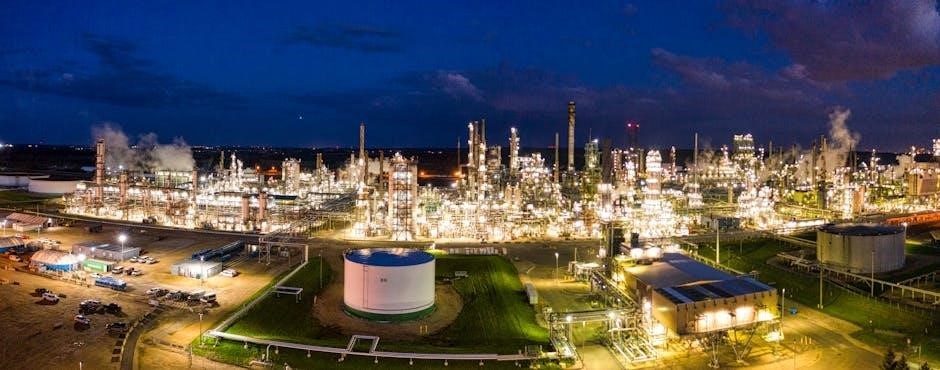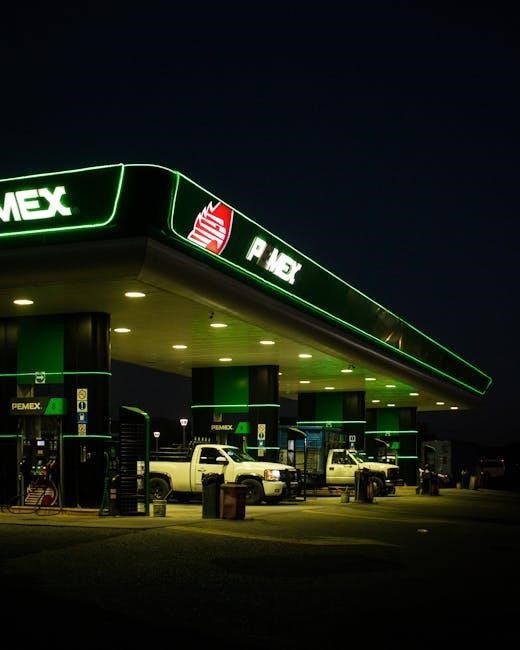The International Fuel Gas Code (IFGC) provides comprehensive regulations for the safe installation and maintenance of fuel gas systems and appliances․ Published by the International Code Council (ICC), it ensures compliance with safety standards, covering design, installation, and performance requirements․ Regular updates, such as the 2021 and 2024 editions, incorporate new technologies and practices, making it a critical resource for professionals and policymakers․
Overview of the IFGC
The International Fuel Gas Code (IFGC) is a model code published by the International Code Council (ICC) that establishes minimum safety standards for fuel gas systems and appliances․ It applies to residential, commercial, and industrial settings, addressing design, installation, and maintenance․ The code uses prescriptive and performance-based requirements to ensure safe operations․ Regular updates reflect advancements in technology and industry practices, making it a foundational document for compliance and safety in fuel gas systems․
Importance of the IFGC in Safety Standards
The IFGC plays a critical role in safeguarding public health and safety by establishing minimum requirements for fuel gas systems․ It mitigates risks associated with gas leaks, explosions, and fires through rigorous design and installation standards․ The code ensures compliance with safety protocols, protecting occupants, properties, and communities․ Its guidelines are essential for preventing hazards and ensuring reliable operation of gas-fired appliances and systems across residential, commercial, and industrial applications․
2021 Edition of the International Fuel Gas Code
The 2021 IFGC provides updated guidelines for fuel gas systems, ensuring safety and compliance․ It aligns with other International Codes and is available as a downloadable PDF․
Key Features and Updates
The 2021 IFGC introduces updated provisions for fuel gas systems, including the termination of concealed condensate piping and the acceptance of press-connect joints for high-pressure applications․ It aligns with other International Codes, ensuring consistency and safety․ The edition also incorporates new technologies and materials, reflecting modern industry practices․ These updates aim to enhance safety, improve compliance, and provide clearer guidelines for installations and inspections․
Changes from Previous Editions
The IFGC has evolved to address emerging technologies and safety needs․ The 2021 edition introduced updates like marking requirements for concealed condensate piping and expanded press-connect joint applications․ The 2024 edition added Appendix D-105․2, detailing combustion air and vent drafting tests, and enhanced digital accessibility․ These revisions reflect ongoing efforts to modernize fuel gas system standards, ensuring safety and efficiency across various applications․
2024 Edition of the International Fuel Gas Code
The 2024 IFGC focuses on modernizing fuel gas system standards, emphasizing digital transformation and enhanced user experience․ It aligns print and PDF versions for better accessibility and clarity․
New Provisions and Enhancements
The 2024 IFGC introduces updated provisions for fuel gas systems, including revised requirements for combustion air testing and vent drafting․ Enhancements focus on digital accessibility, aligning print and PDF versions for consistency․ New appendices provide clarified guidelines, ensuring modern practices and materials are addressed․ These updates aim to improve safety, compliance, and user experience across residential and industrial applications․
Alignment with Digital Transformation
The 2024 IFGC aligns with the International Code Council’s digital transformation strategy, enhancing user experience through consistent formatting in print and digital versions․ The code is now more accessible across platforms, ensuring ease of use for professionals and policymakers․ This digital evolution supports modern practices, providing a seamless experience for users while maintaining the highest safety and compliance standards․

Key Changes in the IFGC
The IFGC introduces updates to fuel gas system requirements, including enhanced safety standards for concealed condensate piping and press-connect joints for high-pressure applications, improving overall compliance and efficiency․
Termination of Concealed Condensate Piping
The IFGC now requires concealed condensate piping terminations to be clearly marked, indicating whether they serve as primary or secondary drains․ This update ensures proper drainage and prevents blockages, enhancing safety and system efficiency․ The 2021 edition introduced this change to address potential issues in concealed systems, aligning with broader safety standards for fuel gas installations․ This provision is detailed in the code to guide installers and inspectors effectively․
Press-Connect Joints for High Pressure Applications
The IFGC now permits press-connect joints for high-pressure fuel gas systems, exceeding 5 psig, in indoor applications․ This update reflects advancements in fitting technology, offering a reliable and efficient connection method․ The 2021 edition introduced this provision to enhance system integrity and reduce potential leaks․ Press-connect joints provide easier installation while maintaining safety, aligning with modern engineering practices for gas systems․

Why the IFGC is Crucial for Professionals
The IFGC is essential for professionals, ensuring compliance with safety standards for fuel gas systems․ It impacts both residential and industrial applications, guiding proper design and installation practices․
Impact on Residential and Industrial Gas Systems
The IFGC significantly influences both residential and industrial gas systems by ensuring safe installation and operation․ It regulates design, materials, and maintenance for fuel gas systems, impacting everything from home appliances to large-scale industrial piping․ Compliance with the IFGC is crucial for preventing hazards and ensuring efficiency in gas systems across all sectors․
Role in Ensuring Compliance and Safety
The IFGC plays a pivotal role in ensuring compliance and safety by establishing clear standards for fuel gas systems․ It mandates regular inspections, proper installation techniques, and adherence to performance requirements, minimizing risks of leaks, fires, and other hazards․ Non-compliance can lead to severe penalties and safety threats, making the IFGC indispensable for protecting public health and property while aligning with modern advancements in gas technology․

How to Access the IFGC PDF for Free
The IFGC PDF can be accessed for free through authorized platforms like the International Code Council’s official website or designated public resources, ensuring legality and reliability․
Authorized Sources for Download
The IFGC PDF can be downloaded for free from the International Code Council (ICC) official website or through local government portals that provide access to building codes; Additionally, public libraries and universities with construction code subscriptions often offer free access․ Ensure downloads are from reputable sources to guarantee authenticity and compliance with copyright laws, avoiding unauthorized or pirated versions that may lack critical updates or accuracy․
Legality and Reliability of Free Downloads
Free downloads of the IFGC PDF must be obtained from authorized sources to ensure legality and reliability․ The International Code Council (ICC) and local government websites provide legitimate access, guaranteeing the document’s accuracy and compliance with copyright laws․ Beware of unauthorized platforms, as they may offer outdated or altered versions, potentially leading to legal consequences or non-compliance with safety standards․ Always verify the source’s credibility․

Compliance with the IFGC
Compliance with the IFGC is crucial for the safe installation and operation of fuel gas systems, ensuring public safety and avoiding legal penalties through strict adherence․
Adoption by Local Authorities
Local authorities widely adopt the IFGC to ensure safety and consistency in fuel gas systems․ Cities often incorporate the code, such as the 2015/2021 edition, with modifications․ Adoption ensures uniformity in installation and maintenance standards, reducing risks and legal liabilities․ The 2024 edition’s digital transformation aligns with modern accessibility needs, facilitating easier enforcement and compliance by local governments and professionals․
Consequences of Non-Compliance
Non-compliance with the IFGC can lead to severe safety risks, legal penalties, and financial losses․ Violations may result in system failures, accidents, and environmental hazards․ Authorities may impose fines, shutdowns, or legal actions against non-compliant entities․ Additionally, insurance claims and reputational damage can follow․ Adhering to the code is essential to avoid these consequences and ensure public safety and operational integrity․

Key Provisions of the IFGC
The IFGC outlines design, installation, and performance standards for fuel gas systems and appliances, ensuring safety and compliance through prescriptive and performance-based requirements․
Design and Installation Requirements
The IFGC specifies detailed design and installation standards for fuel gas systems, including material specifications, venting systems, and clearance requirements․ It mandates proper sizing of gas lines and safety vents to ensure safe operation․ The code also addresses testing protocols for system integrity and leak detection․ Updates in the 2021 edition include enhanced provisions for terminating concealed condensate piping and press-connect joints in high-pressure applications, reflecting modern safety advancements․
Performance and Prescriptive Standards
The IFGC outlines both performance and prescriptive standards to ensure fuel gas systems operate safely and efficiently․ Performance standards specify measurable outcomes, such as combustion air requirements, while prescriptive standards detail exact installation methods․ The 2021 edition enhanced these standards with updated testing protocols for combustion air and vent drafting, ensuring systems meet strict safety and efficiency benchmarks․ These dual approaches provide flexibility and clarity for compliance․
Training and Certification Based on IFGC
Professional training programs and certifications based on the IFGC ensure individuals are well-versed in fuel gas system safety, design, and installation standards, promoting compliance and expertise․
Available Courses and Resources
Various training programs and resources are available to help professionals master the IFGC․ These include certification courses, study guides, and practice exams designed to enhance understanding of fuel gas system safety and compliance․ Online platforms offer webinars and interactive modules for flexible learning․ Additionally, the ICC website provides access to PDF manuals and update summaries, ensuring professionals stay informed about the latest code changes and best practices․
Importance of Professional Training
Professional training is essential for ensuring compliance with the IFGC and maintaining safety standards․ It equips individuals with the knowledge to interpret code requirements, understand updates, and apply best practices․ Proper training reduces risks of non-compliance and ensures fuel gas systems are installed and maintained correctly․ Regular certification programs and updates help professionals stay informed about the latest code changes and advancements in technology․

Digital Transformation of the IFGC
The 2024 IFGC aligns with the ICC’s digital strategy, enhancing user experience through improved formatting and accessibility across platforms․ This transformation ensures consistency between print and digital versions․
Enhanced User Experience in Digital Formats
The 2024 IFGC digital format offers enhanced readability and navigation, with interactive features like cross-referencing and search functionality․ This improves accessibility for professionals and policymakers, ensuring efficient compliance and safety adherence․
Accessibility Across Platforms
The 2024 IFGC is designed to be accessible across multiple platforms, ensuring compatibility with mobile, tablet, and desktop devices․ This digital transformation allows professionals to access the code seamlessly, regardless of their device․ Enhanced readability and navigation features improve the user experience, making it easier for policymakers and practitioners to reference the code on any platform, fostering widespread adoption and compliance with safety standards․
Appendices and Reference Materials
The IFGC includes appendices with supplementary guidelines, tables, and figures, providing detailed support for fuel gas system design and installation requirements, enhancing practical application and compliance․
Useful Guidelines and Standards
The IFGC appendices provide detailed guidelines and standards for fuel gas systems, including prescriptive and performance-based requirements․ These resources offer practical examples, illustrations, and tables to aid in design, installation, and compliance․ They cover topics like combustion air calculations, venting systems, and piping design, ensuring professionals can apply the code effectively․ These supplementary materials are essential for ensuring safety and efficiency in fuel gas system installations;
Examples and Illustrations
The IFGC includes detailed examples and illustrations to clarify complex requirements․ Diagrams for venting systems, combustion air calculations, and piping layouts provide visual guidance․ Tables and charts summarize key specifications, such as pipe sizing and pressure limits․ These resources help professionals understand and apply the code effectively, ensuring compliance and safety in fuel gas system installations․ They are invaluable for both novice and experienced practitioners․

Case Studies and Practical Applications
Real-world examples demonstrate the IFGC’s application in residential and industrial gas system installations, showcasing safety measures and compliance strategies․ Practical insights ensure effective implementation and adherence to standards․
Real-World Implementation of IFGC
The IFGC is applied in various settings, from residential gas lines to industrial fuel systems․ Real-world projects demonstrate its practicality, ensuring safety and compliance․ For instance, engineers use the code to design gas piping systems, while contractors rely on it for installation guidelines․ Case studies highlight how adherence to the IFGC minimizes risks, such as gas leaks or appliance malfunctions․ This ensures efficient, hazard-free fuel gas systems across industries․
Lessons Learned from Past Projects
Past projects highlight the importance of adhering to IFGC standards to ensure safe fuel gas system installations․ Key lessons include the necessity of proper material selection and adherence to installation guidelines․ For example, the 2021 IFGC updates on condensate piping termination and high-pressure press-connect joints have been critical in preventing system failures․ These insights emphasize the value of regular code updates and rigorous compliance to avoid potential hazards․

Frequently Asked Questions
Is the IFGC PDF available for free? Yes, authorized sources offer free downloads, ensuring legality and reliability for professionals and homeowners․ What are the key updates in the 2021 IFGC? Updates include new provisions for condensate piping termination and press-connect joints, enhancing safety and compliance standards․
Common Queries About the IFGC
Common questions about the IFGC include its availability for free download, updates in the 2021 and 2024 editions, and compliance requirements․ Professionals often inquire about specific provisions, such as termination of concealed condensate piping and press-connect joints for high-pressure applications․ Many seek clarification on installation standards and safety protocols to ensure adherence to local regulations․ The IFGC’s alignment with digital transformation is also a frequent topic of discussion among users․
Clarifications on Key Provisions
Clarifications on the IFGC often address specific sections, such as termination of concealed condensate piping and press-connect joints for high-pressure applications․ Updates in the 2021 and 2024 editions provide additional guidance on installation and safety standards․ The code emphasizes prescriptive and performance-based requirements, ensuring compliance with local regulations․ Professionals frequently seek interpretations of these provisions to ensure adherence to safety protocols and best practices in fuel gas system design and maintenance․
Additional Resources and References
The IFGC is supported by official publications, guides, and training materials․ Resources like the International Fuel Gas Code Companion and ICC educational courses provide detailed insights and practical examples․
Supplementary Materials for Deeper Understanding
Supplementary materials, such as the International Fuel Gas Code Companion, provide in-depth explanations and practical examples to enhance understanding․ Training courses and reference guides are also available, offering detailed insights into code applications․ These resources help professionals master the complexities of fuel gas system design and installation, ensuring compliance with safety standards and best practices;
Recommended Reading and Tools
Recommended reading includes the International Fuel Gas Code Companion, offering practical insights and examples․ Online training modules and workshops are also essential tools for understanding code applications․ Additionally, digital libraries and code reference platforms provide accessible resources for professionals․ These tools ensure comprehensive understanding and compliance with fuel gas system standards and regulations․

Future Updates and Revisions
The IFGC undergoes periodic revisions to incorporate new technologies and safety standards․ Future editions will focus on enhanced digital accessibility and streamlined code enforcement processes․
Anticipated Changes in Upcoming Editions
Future IFGC editions are expected to enhance digital accessibility and streamline code enforcement․ The 2024 edition already reflects a digital transformation, improving user experience across platforms․ New provisions, such as updated testing requirements for combustion air and vent drafting, will be included․ These changes aim to align with modern safety standards and technological advancements, ensuring the code remains relevant and effective for fuel gas systems․
Staying Informed About Updates
Staying informed about IFGC updates is crucial for compliance and safety․ The International Code Council (ICC) regularly releases new editions, such as the 2024 update, which includes digital enhancements․ Professionals can access updates through the ICC website or authorized sources․ Subscribing to newsletters and attending industry workshops ensures awareness of the latest changes․ Regularly reviewing the official IFGC PDF and participating in training programs helps maintain knowledge of current standards and safety protocols․
The IFGC is essential for ensuring safety and efficiency in fuel gas systems․ Its regular updates and comprehensive guidelines make it a cornerstone of modern construction standards․
The IFGC establishes essential regulations for fuel gas systems, ensuring safety, efficiency, and compliance․ It provides prescriptive and performance-based standards, adapting to new materials and technologies․ By addressing design, installation, and maintenance, the IFGC protects public health and safety․ Its updates reflect industry advancements, making it a foundational resource for professionals and authorities․ Compliance with the IFGC is vital for preventing hazards and ensuring reliable gas systems․
Final Thoughts on Compliance and Safety
Compliance with the IFGC is non-negotiable for ensuring public health and safety․ Adhering to its standards prevents hazards, protects infrastructure, and safeguards communities․ Non-compliance risks legal penalties, accidents, and environmental harm․ Professionals and authorities must prioritize staying updated with the latest editions to maintain reliable and secure fuel gas systems․ The IFGC serves as a cornerstone for safety, making compliance an ethical and legal imperative for all stakeholders involved․